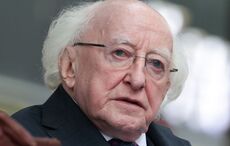Ireland is in the midst of a political crisis following the inconclusive result of the recent general election. No party emerged with a clear majority and there is no sign at present of any alliance being put together for the purpose of forming a government.
Some experts are talking about a “confidence and supply arrangement which would allow a minority government to function, as is currently the case in New Zealand.
The Sunday Independent stated that “'Confidence and supply' is an agreement that is more loose than a formal coalition. Under such a deal, a smaller party (or number of parties) backs a larger party in government on a vote-by-vote basis, in exchange for policy concessions, on budget and other key votes that could otherwise bring a government down if they did not pass.”
But there is a very real prospect that another general election may have to be called in about six weeks' time. But an opinion poll carried out by the Red C company and published in the Sunday Business Post newspaper at the weekend showed that a second vote would still be inconclusive.
Read more: Enda Kenny to cut US St. Patrick’s Day visit short amid political turmoil
The poll placed Fine Gael on 27 percent, only 1.5 points higher than its election performance. Ratings for other parties were as follows (election figure in brackets): Fianna Fáil 25 (24.3); Sinn Féin 15 (13.8); Labour 4 (6.6); Anti-Austerity Alliance/People Before Profit 4 (3.9); Social Democrats 5 (3); Green Party 3 (2.7); Renua Ireland 2(2.2); Others 15 (17.9).
The Labour Party, which was Fine Gael's minority partner in the outgoing coalition administration, has now been reduced from 33 seats to seven in Dáil Éireann, the main house of the Irish parliament, which has a total of 158 deputies. This means Labour cannot play any major role in the formation of the next government.
Many commentators believe the only solution is a "grand alliance" of the old Civil War parties, Fine Gael and Fianna Fáil, but the latter appears to be strongly opposed to any such arrangement.
The only way to avoid a general election in the short term may be a minority government whereby Fine Gael would remain in office with the support of Fianna Fáil from the opposition benches. Alternatively, Fianna Fail could be the minority government with Fine Gael backing from outside.
The leader of Fine Gael, Enda Kenny is continuing as Taoiseach (prime minister) in a caretaker capacity. He is cutting short his annual visit to the US for the St Patrick's festivities this week so that he can attend to the crisis situation back home.
Kenny is due to report on efforts to form a government when the Dáil meets again on March 22. The next vote in the Dáil on the position of Taoiseach is due to take place on April 6.
Fianna Fáíl is understood to be concerned that joining Fine Gael in a coalition government would leave Sinn Féin as the main party in opposition and the most obvious alternative to a Fine Gael-Fianna Fáil administration.
The main focus of political debate at present is on whether Fianna Fáil can remain in opposition while agreeing to the key elements of policy that Fine Gael would pursue in government.
There is considerable skepticism among observers and commentators that any arrangement can be reached which would allow a minority government to remain in office for long. There is consequently a widespread view that another election is inevitable in the near future.
Fianna Fáil has appointed a team of four Dáil deputies – Michael McGrath, Barry Cowen, Jim O'Callaghan and Charlie McConalogue – to negotiate with Independent TDs and fringe parties on a possible joint approach in the current situation. Fine Gael is also holding talks with the Independents.
Meanwhile, there is speculation that the position of Gerry Adams as leader of Sinn Féin might be redefined to allow for a greater role for his deputy, Mary Lou McDonald and/or the party's economic spokesman, Pearse Doherty. Adams is popular with members of the public but stumbled badly in media interviews during the election on the implications of party policy.
NOTE: Deaglán de Bréadún is a Dublin-based journalist and the author of "Power Play: The Rise of Modern Sinn Féin" (Merrion Press).




Comments